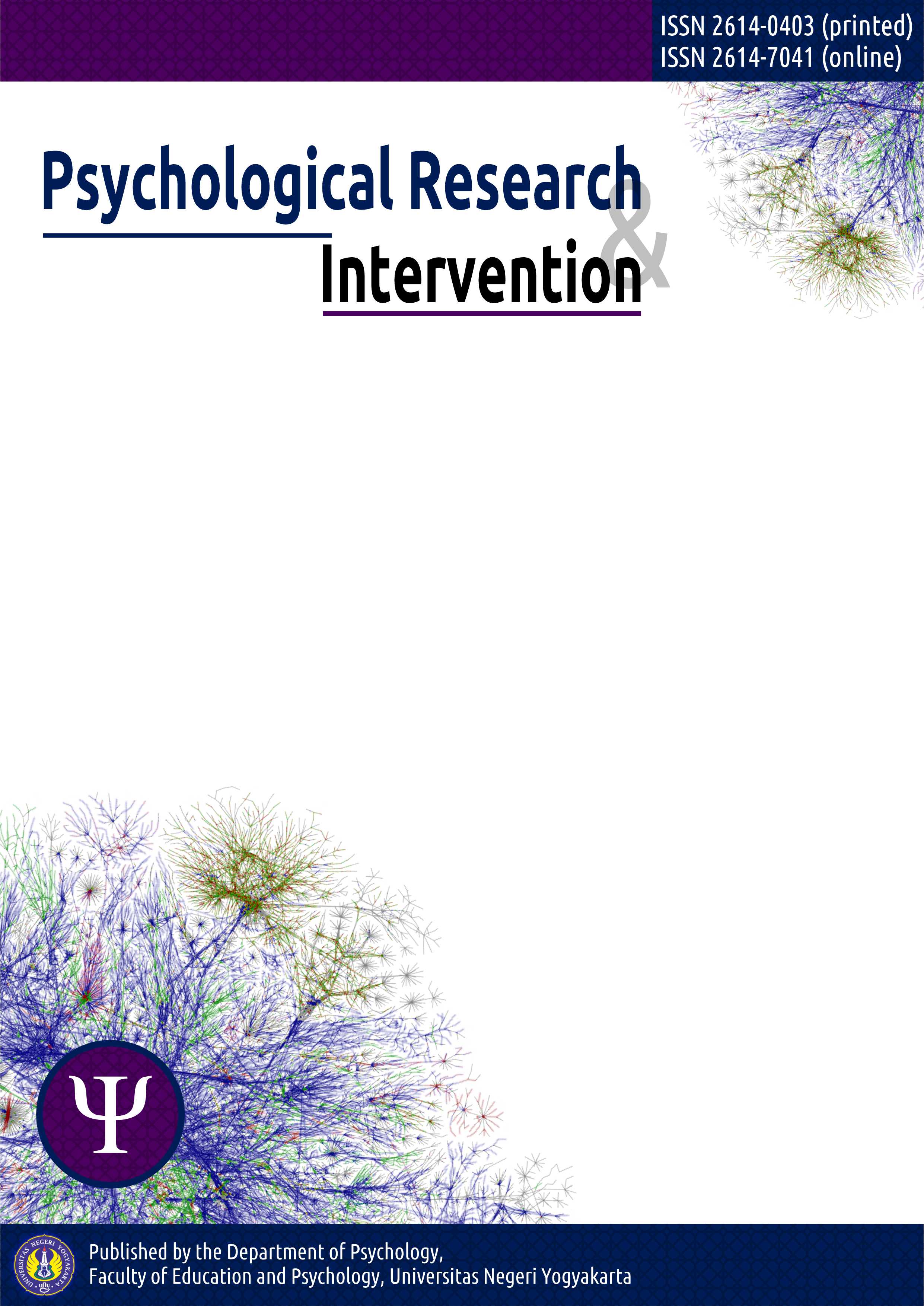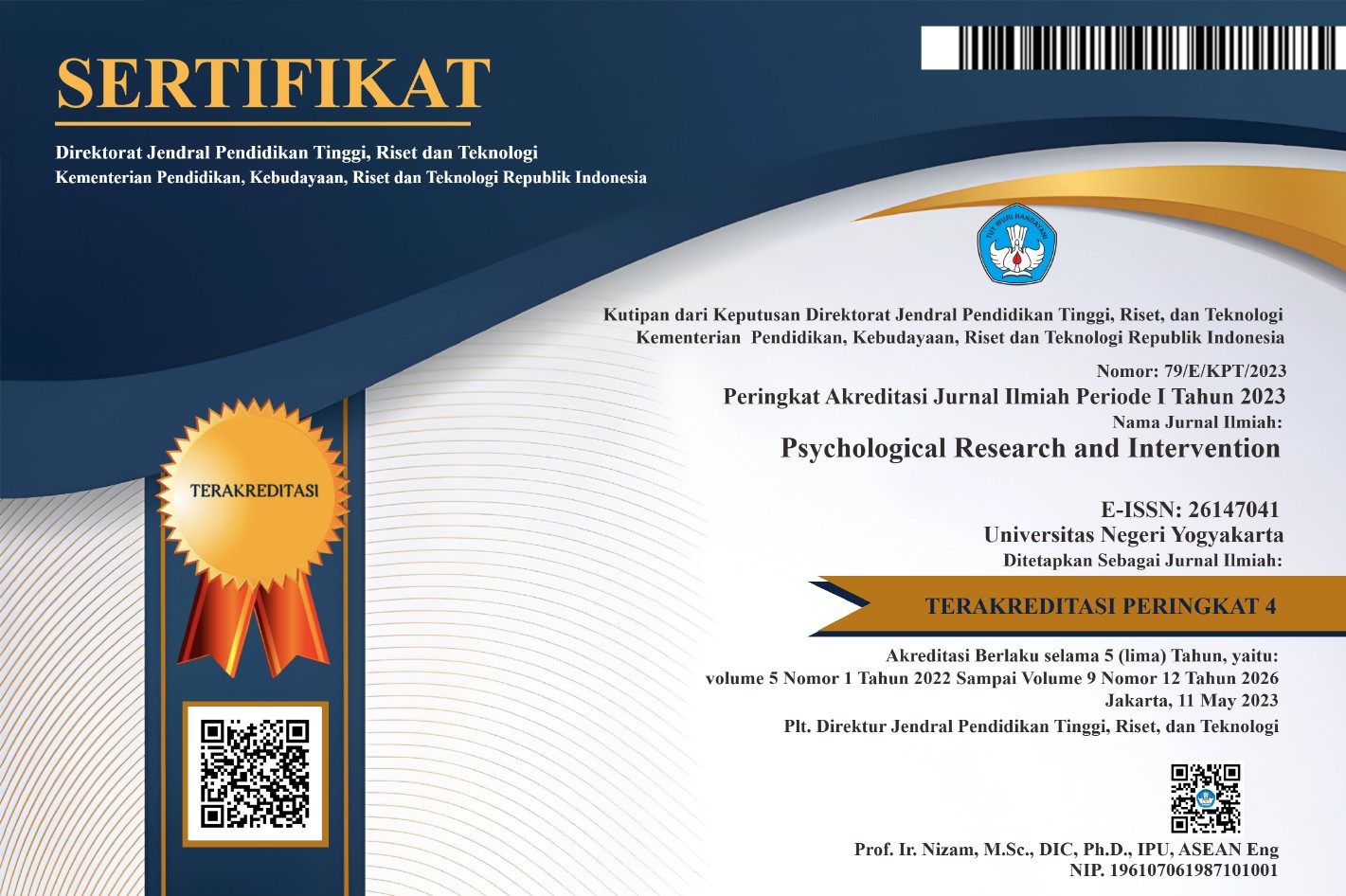Coping Strategy and Psychological Well-Being of Final Year University Student
DOI:
https://doi.org/10.21831/pri.v2i2.30364Keywords:
problem focused coping, emotional focused coping, psychological well-being, final year university studentAbstract
This study aims to determine the coping strategies and level of psychological well-being of final year university student, as well as predicting psychological well-being of final year university student based on their coping strategies. This study employs quantitative approach with ex post facto research type. This study involves 135 university students from Faculty of Education Universitas Negeri Yogyakarta by means of accidental sampling technique. Data was collected through the coping scale (problem focused coping scale and emotional focused coping scale) and psychological well-being scale. The result of this study shows that coping strategy was able to predict psychological well-being (p = 0,000; p < α 0,05). Problem focused coping and emotional focused coping can predict psychological well-being by 12%. The regression equation line obtained is Y = 132,05+0,819x1-0,501x2
References
Atzmí¼ller, C., & Steiner, P.M. (2010). Experimental vignette studies in survey research. Methodology European Journal of Research Methods for the Behavioral and Social Sciences, 6(3), 128–138. doi:10.1027/1614-2241/a000014
Azwar, S. (2018). Metode Penelitian Psikologi (Edisi II). Yogyakarta: Pustaka Pelajar.
Badan Penelitian dan Pengembangan Kesehatan. (2013). Riset Kesehatan Dasar (RISKESDAS) 2013. Kementerian Kesehatan, Jakarta.
Bener, A., & Ghuloum, S. (2010). Gender differences in the knowledge, attitude and practice towards mental health illness in a rapidly developing Arab society. International Journal of Social Psychiatry, 57(5), 480–486. doi:10.1177/0020764010374415
Biddle, L., Donovan, J., Sharp, D., & Gunnell, D. (2007). Explaining non- help-seeking amongst young adults with mental distress: a dynamic interpretive model of illness behavior. Sociology of Health & Illness, 29(7), 983–1002. doi:10.1111/j.1467-9566.2007.01030.x
Chang, C. (2008). Increasing mental health literacy via narrative advertising. Journal of Health Communication, 13, 37–55. doi:10.1080/10810730701807027
Cotton, S.M., Wright, A., Harris, M.G., & Jorm, A.F. (2006). Influence of gender on mental health literacy in young Australians. Australian and New Zealand Journal of Psychiatry, 40, 790–796. doi:10.1080/j.1440-1614.2006.01885.x
Diaz-Granados, N., & Stewart, D.E. (2007). Using a gender lens to monitor mental health. International Journal of Public Health, 52, 197– 198. doi:10.1007/s00038-007-0217-2
Ellis, L. A., Collin, P., Hurley, P. J., Davenport, T. A., Burns, J. M., & Hickie, I. B. (2013). Young men's attitudes and behaviour in relation to mental health and technology: Implications for the development of online mental health services. BMC Psychiatry, 13, 119. doi:10.1186/1471-244X-13-119.
Fakih, M. (2013). Analisis Gender & Transformasi Sosial. Yogyakarta: Pustaka Pelajar.
Farrer, L., Griffiths, K.M., Leach, L.S., & Christensen, H. (2008). Age differences in mental health literacy. BMC Public Health, 8. doi:10.1186/1471-2458-8-125
Furnham, A., & Swami, V. (2018). Mental health literacy: A review of what it is and why it matters. International Perspectives in Psychology: Research, Practice, Consultation, 7(4), 240–257. doi:10.1037/ipp0000094
Gibbons, R.J., Thorsteinsson, E.B., Loi, N.M. (2015). Beliefs and attitudes towards mental illness: an examination of the sex differences in mental health literacy in a community sample. PeerJ, 3, e1004. doi:10.7717/peerj.1004
Hadjimina, E., & Furnham, A. (2017). Influence of age and gender differences on mental health literacy of anxiety disorders. Psychiatry Research, 251, 8–13. doi:10.1016/j.psychres.2017.01.089
Holland, D., & Wheeler, H. (2016). College student stress and mental health: examination of stigmatic views on mental health counseling. Michigan Sociological Review, 30, 16–34.
Holzinger, A., Floris, F., Schomerus, G., Carta, M. G., & Angermeyer, M. C. (2012). Gender differences in public beliefs and attitudes about mental disorder in western countries: A systematic review of population studies. Epidemiology and Psychiatric Sciences, 21, 73–85. doi:10.1017/s2045796011000552
Hox, J.J., Kreft, I.G.G., & Hermkens, L.J. (1991). The Analysis of Factorial Surveys. Sociological Methods & Research, 19, 493–510. doi:10.1177/0049124191019004003
Hunt, J., & Eisenberg, D. (2010). Mental health problems and help-seeking behavior among college students. Journal of Adolescent Health, 46, 3–10. doi:10.1016/j.jadohealth.2009.08.008
Jorm, A.F., Korten, A.E., Jacomb, P.A., Christensen, H., Rodgers, B., & Pollitt, P. (1997a). "Mental health literacy": a survey of the public's ability to recognise mental disorders and their beliefs about the effectiveness of treatment. The Medical Journal of Australia, 166(4). doi:10.5694/j.1326-5377.1997.tb140071.x
Jorm, A.F., Korten, A.E., Jacomb, P.A., Christensen, H., Rodgers, B., & Pollitt, P. (1997b). Public beliefs about causes and risk factors for depression and schizophrenia. Social Psychiatry and Psychiatric Epidemiology, 32, 143–148. doi:10.1007/BF00794613
Jorm, A.F. (2012). Mental health literacy: Empowering the community to take action for better mental health. American Psychologist, 67(3), 1–13. doi:10.1037/a0025957
Lauber, C., Nordt, C., Falcato, L., & Rí¶ssler, W. (2003). Do people recognise mental illness? Factors influencing mental health literacy. European Archives of Psychiatry and Clinical Neurosciences, 253, 248–251. doi:10.1007/s00406-003-0439-0
Leighton, S. (2010). Using a vignette-based questionnaire to explore adolescents' understanding of mental health issues. Clinical Child Psychology and Psychiatry, 15(2) 231–250. doi:10.1177/1359104509340234
Marcus, M., & Westra, H. (2012). Mental health literacy in Canadian young adults: results of a national survey. Canadian Journal of Community Mental Health, 31(1). doi:10.7870/cjcmh-2012-0002
Novianty, A., & Hadjam, M.N.R. (2017). Literasi kesehatan mental dan sikap komunitas sebagai prediktor pencarian pertolongan formal. Jurnal Psikologi, 44(1), 50–65. doi:10.22146/jpsi.22988
Pangkalan Data Pendidikan Tinggi Kementerian Riset, Teknologi Dan Pendidikan Tinggi. https://forlap.ristekdikti.go.id. Accessed 23 March 2019.
Reavley, N., McCann, T., & Jorm, A.F. (2012). Mental health literacy in higher education students. Early Intervention in Psychiatry, 6, 45–52. doi:10.1111/j.1751-7893.2011.00314.x
Vidourek, R., King, K., Nabors, L., Lynch, A., & Merianos, A. (2014). College students' perceived confidence in mental health help-seeking. International Journal of Mental Health Promotion, 16(2), 83–90. doi:10.1080/14623730.2014.892257
Wang, J., Adair, C., Fick, G., Lai, D., Evans, B., Perry, B.W., Jorm, A., Addington, D. (2007). Depression literacy in Alberta: Findings from a general population sample. The Canadian Journal of Psychiatry, 52(7), 442–449. doi:10.1177/070674370705200706
Wong, K. (2016). Gender differences in mental health literacy of university students. Western Undergraduate Psychology Journal, 4(1).












